|
Prominent personalities who fell victims to LTTE's
terror:
Assassination of outstanding personalities of international repute
The LTTE's policy of systematical
annihilation of outstanding personalities, who they thought impediments
to their cause, robbed the country of military leaders, statesmen,
promising national leaders and academics of international repute. Below
are several of them:
Political leaders and statesmen
Rajiv Gandhi (20 August, 1944 - 21 May, 1991), the elder son
of Indira Nehru and Feroze Gandhi, was the 9th Prime Minister of India
from his mother's death on October 31, 1984 until his resignation on
December 2, 1989 following a general election defeat. He became the
youngest Prime Minister of India when he took office (at the age of 40).
Rajiv Gandhi was a professional pilot for Indian Airlines before
entering politics. While at Cambridge, he met Italian-born Sonia Maino
whom he later married. He remained aloof from politics despite his
mother being the Indian Prime Minister, and it was only following the
death of his younger brother Sanjay Gandhi in 1980 that Rajiv entered
politics. After the assassination of his mother in 1984 after Operation
Blue Star, Indian National Congress party leaders nominated him to be
Prime Minister.
Rajiv Gandhi led the Congress to a major election victory in 1984
soon after, amassing the largest majority ever in Indian Parliament. The
Congress Party won 411 seats out of 542. He began dismantling the
License Raj - government quotas, tariffs and permit regulations on
economic activity - modernized the telecommunications industry, the
education system, expanded science and technology initiatives and
improved relations with the United States.
In 1988, Rajiv reversed the coup in Maldives antagonising the
militant Tamil outfits such as PLOTE. He also was responsible for first
intervening and then sending Indian troops (Indian Peace Keeping Force
or IPKF) for peace efforts in Sri Lanka in 1987, which soon ended in
open conflict with the Liberation Tigers of Tamil Eelam (LTTE) group. In
mid-1987, the Bofors scandal broke his honest, corruption-free image and
resulted in a major defeat for his party in the 1989 elections.
Rajiv Gandhi remained Congress President until the elections in 1991.
While campaigning, he was assassinated by the Liberation Tigers of Tamil
Eelam (LTTE or Tamil Tigers) group. His widow Sonia Gandhi became the
leader of the Congress Party in 1998, and led the party to victory in
the 2004 elections. His son Rahul Gandhi is a Member of Parliament and
the General Secretary of All India Congress Committee.[1]
Rajiv Gandhi was posthumously awarded the Highest National Award of
India, Bharat Ratna, joining a list of 40 luminaries, including Indira
Gandhi.
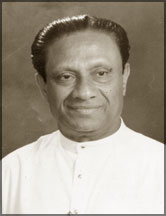 |
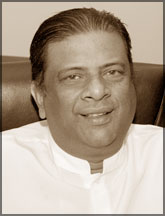 |
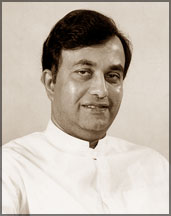 |
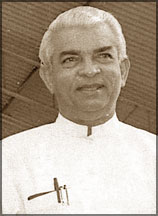 |
|
Ranasinghe Premadasa |
Jeyaraj Fernandopulle |
Gamini Dissanayake |
Ranjan Wijeratne |
Sri Lankabhimanya Lakshman Kadirgamar PC (April 12, 1932 -
August 12, 2005) was a Sri Lankan diplomat, politician and lawyer. After
a distinguished career as a lawyer and international humanitarian, he
was appointed as Foreign Minister of Sri Lanka in 1994 by President
Chandrika Kumaratunga. He achieved international prominence in this
position due to his wide ranging condemnation of the LTTE (Tamil Tigers)
and his efforts to have them banned internationally. He served until
2001, and then again from April, 2004 until his assassination in August,
2005, which was carried out by an LTTE terrorist sniper. The suspects
arrested in his murder case were released after no evidence was found
after over two years in custody.
Ranasinghe Premadasa (June 23, 1924 - May 1, 1993) was the 3rd
President of Sri Lanka from January 2, 1989 to May 1, 1993. Before that,
he served as the Prime Minister in the government headed by J. R.
Jayewardene from February 6, 1978 to January 1, 1989. He was
assassinated in Colombo in a suicide bombing, by the LTTE.
Gamini Dissanayake
Lionel Gamini Dissanayake (March 20, 1942 - October 24, 1994) was a
prominent Sri Lankan politician and a former presidential candidate and
Leader of the Opposition.
After President D.B. Wijetunga indicated he would not run in the 1994
Presidential Election, Dissanayake was nominated as the UNP candidate at
the same time he was the Leader of the Opposition in Parliament. This
was cut short when he was assassinated by a female suicide bomber of the
Liberation Tigers of Tamil Eelam (LTTE).[1] His wife Srima ran in his
stead, but was defeated by People's Alliance candidate & then Prime
Minister Chandrika Kumaratunga.
Academics
Dr. Rajini Thiranagama
Dr. Rajini Thiranagama (nee Rajasingham) (February 23, 1954-September
21, 1989) was a Tamil human rights activist and feminist who was shot
dead by Tamil Tiger cadres after she criticised them for their
atrocities. At the time of her assassination she was the head of the
Department of Anatomy at the University of Jaffna and an active member
of University Teachers for Human Rights, Jaffna branch of which she is
one of the founding members.
Assassination
A few weeks after the publication of book, The Broken Palmyra, on
September 21, 1989, she was shot dead at Thirunelvely, Jaffna in front
of her house by a gunman while cycling back from work. University
Teachers for Human Rights, Jaffna and Rajini's sister accuse the LTTE of
her murder, retaliating against her criticism of their violent tactics.
Legacy and memorials
Documentary Film
In a documentary released worldwide in 2005, No More Tears Sister: An
Anatomy of Hope and Betrayal, produced by the National Film Board of
Canada, Rajini's life and her legacy are vividly brought to life.
(Wikipedia-internet encyclopedia)
Neelan Tiruchelvam
Neelan Tiruchelvam (sometimes spelled Neelan Thiruchelvam) (January
31, 1944 - July 29, 1999) was a Sri Lankan Tamil politician and an
internationally respected academic. He was assassinated by an LTTE
suicide bomber in July, 1999.
Neelan Tiruchelvam was a scholar, an international activist and a
legislator, as well as a practicing lawyer, social scientist and
politician.
Dr. Tiruchelvam was assassinated on July 29, 1999. Before his
assassination, he had worked with his childhood friend, President
Chandrika Kumaratunga and Prof. G.L. Peiris on a devolution package
which he hoped would address the historical demands of the Tamils.
As a peacemaker, he worked to resolve the ethnic conflict in Sri
Lanka through non-violent political means, including consensus building,
negotiation and constitutional reform. Dr. Tiruchelvam was the founder
and Director of the International Centre for Ethnic Studies and the
founder and Director of the Law and Society Trust: two of Sri Lanka's
leading research and policy organisations.
In his career as a public intellectual, Dr. Tiruchelvam built bridges
and sought common ground in a deeply divided society through
scholarship, activism and politics.
His thoughts and actions were animated by a personal philosophy of
humanism, peace and non-violence. Firmly committed to change and reform
for resolving deep-rooted problems of the Sri Lankan society, he sought
to spearhead transformation through dialogue, tolerance and
deliberation.
Tiruchelvam was a member of the Tamil United Liberation Front which
advocated a negotiated settlement to the ethnic conflict in Sri Lanka.
He was a regular critic of the Liberation Tigers of Tamil Eelam for
their repeated violations of human rights and reluctance to enter into
serious negotiations. Because of this, the LTTE are believed to have
been behind his assassination.
International condemnation of the assassination and praise for the
work that Neelan had done were swift, with prominent persons like U.S.
President Bill Clinton expressing his sadness at the tragic death.
In July, 2001 scholars from 53 countries voted to award Dr. Neelan
Tiruchelvam posthumously with the first Law & Society Association
International Prize.
The prize is "in recognition of scholarship that has contributed
significantly to the advancement of knowledge in the field of law and
society" (Wikipedia)
General Ranjan Wijeratne
General Ranjan Wijeratne (April 4, 1931 - March 2, 1991) was the
former Sri Lankan Cabinet Minister of Foreign Affairs, Minister of State
for Defence (Deputy Defence Minister) and Minister of Plantation
Industries from 1989 to 1991 in President Ranasinghe Premadasa's
Cabinet.
He was assassinated on March 2, 1991, by the LTTE organization using
a remote controlled car bomb while he was travelling to his office in
Colombo on Havelock Road, during rush hour killing 19 people including
the Minister and five bodyguards and 13 civilian bystanders. He was
known to have a hard line stance towards the LTTE.
Lt. Colonel Ranjan Wijeratne was posthumously promoted to the rank of
General and Kotelawala Defence Academy (now Kotelawala Defence
University) at its second convocation, conferred an honorary degree of
Doctor of Law (LLD) (Honoris Causa).
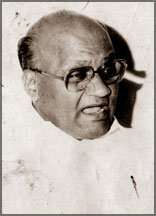 |
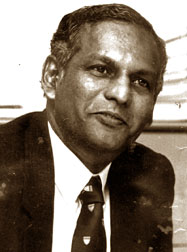 |
|
A. Amirthalingam |
Neelan Tiruchelvam |
|

